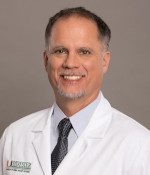Effective Telemedicine During the COVID-19 Health Crisis

Dr. Jonathan Trent, Sylvester Comprehensive Cancer Center, Florida, USA
Cancer patients around the world have faced unique obstacles when coping with the stay-at-home mandates. Dealing with the stress and anxiety of self-isolation, fear of physician and hospital visits as well as not being able to have their regular schedule of monitoring (scans, etc.) are just a few of the issues that patients have had to work through. There are, however, some very hopeful examples of how our health care systems (U.S.) have learned flexibility during this crisis in order to meet patients’ needs. The LRG was fortunate to get a few minutes with GIST specialist, Jonathan Trent, MD, Sylvester Comprehensive Cancer Center, who shared his experience with his patients over the past few months.
Shared Decision-Making with Patients
The burning question that all GIST patients wanted answered was “Do I go to have my regular scans and appointments with my GIST specialist, if they are scheduled?
This proved to be a multi-layered answer based partially on patient needs and payer and industry requirements. Dr. Trent strongly felt that there first needs to be a conversation between the patient and physician about whether scans and appointments could be postponed.
“Staying home is most important. So, the first question is ‘Can I postpone the visit until it’s safe?’ If the patient had their GIST resected six years ago and I’m only seeing them once a year, then I can postpone their visit for two or three months and then reevaluate at that time. If we can do that, it’s better because they don’t have to be exposed at a CAT scan or in a lab. Normally, we see about 25 patients on an average clinic day and we’ve been able to postpone about five patients a day. Right there we’ve pushed about 20% of these appointments into mid- and late summer,” responded Dr. Trent.
There are other considerations as to whether a patient should keep their appointments. Dr. Trent continued, “If they have had their GIST resected less than two years ago, they may still be at risk for recurrence, so we are getting scans on those patients. We’re getting labs. They are getting these tests done locally and then mailing and emailing imaging studies and lab results to our clinic.”
Telemedicine has become an integral part of how Dr. Trent and his team are communicating with patients currently. With labs and scans being mailed in to the clinic, the nursing staff can coordinate that information with the doctors and the doctors can ‘see’ patients via teleconferencing tools from their home so that patients don’t have to travel.
“Sylvester has been very supportive of these efforts and wants us to do whatever it takes to care for our patients and minimize their potential exposure to the Coronavirus. Some institutions across the country continue to require patients to visit in person.” Dr. Trent went on to explain that, “The ability of a physician to see patients by telemedicine also varies from state to state creating regional differences. For instance, I recently had a new telemedicine visit with a GIST patient who lives in Nebraska. She didn’t want to have to appear in person and risk exposure to COVID-19. Luckily, at Sylvester we have been able to do telemedicine visits with patients around the country that weren’t comfortable with in person visits but couldn’t do televisits with their regular oncologist. Additionally, we have had televisits with patients from Brazil, Ecuador,
El Salvador, and even Russia. Personally, I’m still seeing 50-60 patients a week. Not one patient has demanded they be seen in person.”
Dr. Trent says that it’s a “hard decision-making process with patients balancing the potential risk of COVID-19 outweighing the potential risk of recurrence. Some patients adamantly just want to postpone their imaging and labs. And like I said, as far as medications, we have the capability to mail tyrosine kinase inhibitors and self-administered clinical trial medications to all of our patients. So that’s a huge advancement. We do a lot of liquid biopsies , or circulating tumor DNA, in order to determine KIT resistance mutations and guide subsequent therapy. We work with a company to perform this testing at the patient’s home.”
GIST patients have been concerned about their status as immunosuppressed or immunocompromised. Dr. Trent spoke about one situation with a patient on imatinib. “I spent 45 minutes talking with a patient about whether he’s immunosuppressed or not as he’s on imatinib. He doesn’t want to go into work and everything he does at work he can do at home, but his boss doesn’t believe in working from home. The boss wants everybody to be physically in their offices. The patient was panicking. I had to reassure him that it’s [imatinib] not really considered immunosuppressive, although we don’t have a lot of data. It’s not a traditional immunosuppressive agent. I gave him some guidance on gloves and surgical masks and things like that, because it’s, you know, he can’t lose his job or he loses his insurance. It’s a very fine line we are all walking these days.”
How the Team at Sylvester is Coping
Staying connected visually has strengthened the process of telemedicine for both the patients and the staff. Dr. Trent says that his team is faring pretty well conferencing by video at least twice a week to review new patients and make sure there’s no missing information so that the televisit is as productive as possible. “Even though it’s on Zoom, seeing somebody’s face is so much better than just a teleconference,” said Dr. Trent. In addition to clinic held two times a week, the staff also does a virtual tumor board which can include oncology radiologists, pathologists, nurse practitioners, nurses, surgeons, and fellows who are in training and learning from different disciplines twice a week.
“And then, our team, my nurse Vilma Sanchez, nurse practitioner Morgan Mount, and myself are in clinic all day on Tuesday and Wednesday. We’re on Zoom together the whole day basically, and then we usually have a three-way telephone call on the side so that when we exit the clinic in Zoom, we are able pick up the phone and talk to each other. Just like we were sitting next to each other so we’ve been able to keep engaged and connected. The video is the savior, I think that that really helps us stay connected. We’ve had a few Friday evening happy hours too, where we all Zoom and congratulate each other on working hard this week and then just have some fun. We’ve had a couple of virtual birthday parties and a graduation. Two of our nurse practitioners, Solange Sierra and Morgan have young babies and they hold their babies up to the camera for us to interact with their kids. We mix up our Zoom backgrounds; have some fun. Dr. D’Amato has a background that says, ‘What the hell is sarcoma?’”
Dr. Trent shared that he’s been playing a lot of basketball and cooking, too. “I have two sons in college and a daughter in high school. They ended up being at home in virtual school since the middle of March. So, I’ve been playing a lot of 2-on-2 basketball on the small court in my driveway. Of course we’ve been cooking a lot. It’s one thing that you have to do and you can do together when you are home and you can’t go out. I like to barbecue so we’ve been having a lot of brisket, ribs and grilled vegetables. To keep things fun, we had a Thanksgiving dinner a few weeks ago. We did turkey and stuffing, potatoes, green beans, rolls just like the one in November. Tonight, we’re having Christmas dinner.”
How the LRG can help?
Dr. Trent says that the biggest thing the LRG can do for him right now (and more importantly for patients) is to let know that he is available by telemedicine to any patient, even on a temporary basis if they do not feel comfortable going into an office or hospital setting. “There’s very few reasons that you have to go into clinic and potentially expose yourself to COVID-19. At Sylvester, we’re happy to see anybody even on a temporary basis until the pandemic is over. If they need to talk to somebody about GIST or have somebody review the scans, we are happy to do that until they can get back to their regular doctor.”
If you want to connect with Dr. Trent virtually, please contact Sahibjeet Kaur, our LRG Patient Registry Dept. Supervisor, for more information: skaur@liferaftgroup.org You can also check our GIST Specialist Database for a GIST specialist in your area.




